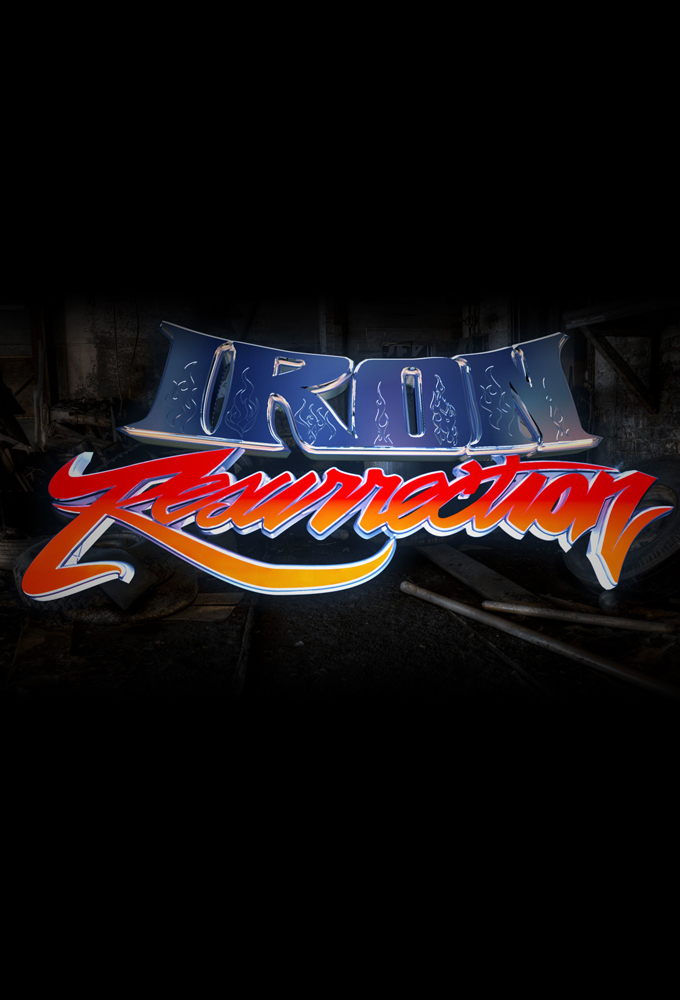Ever wondered what happened to Iron Resurrection? If you're a fan of heavy metal or underground music, this name might ring a bell. Iron Resurrection was one of those bands that had potential to blow up but, well, life happens. In this article, we're diving deep into the question everyone's asking: Was Iron Resurrection cancelled? Let’s get straight to the juicy details and uncover the truth behind the band's disappearance from the scene.
You’ve probably scrolled through forums, social media, or random YouTube comments trying to find out why Iron Resurrection faded away. Was it a creative disagreement? A label issue? Or maybe they just decided to chill out and focus on other things? Whatever the reason, this band left a mark on the underground metal scene, and their story deserves to be told.
Before we dive into the nitty-gritty of whether Iron Resurrection was cancelled or not, let’s set the stage. The band was formed in the late 2000s, a time when the internet was just starting to change how music was consumed. They were part of that transitional era where bands could rise or fall based on how well they adapted to the digital age. So, buckle up because we’re about to take a trip down memory lane.
Read also:Sam Reid Wife The Love Story Youve Been Waiting For
Who Were Iron Resurrection?
Let’s rewind for a sec and talk about who Iron Resurrection actually were. This band wasn’t your typical metal group; they brought a unique blend of traditional heavy metal with a modern twist. Their sound was raw, powerful, and had that edge that made fans go wild at live shows. They were like the underdogs of the metal world, and their music resonated with people who craved authenticity in an era dominated by mainstream trends.
If you’re unfamiliar with the band, here’s a quick breakdown:
- Formed in 2008 in the UK.
- Released two albums: Ironbound (2010) and Resurrection (2013).
- Known for their energetic live performances and die-hard fanbase.
Iron Resurrection wasn’t just about the music; they were about the experience. Their shows were legendary, and they had a way of connecting with their audience that many bands struggle to achieve. But, as we all know, even the best bands can face challenges that lead to unexpected endings.
Iron Resurrection Band Members
Before we dive deeper into the "was Iron Resurrection cancelled" question, let’s talk about the people behind the music. The band consisted of four members who poured their hearts into creating music that stood out. Here’s a quick rundown:
| Name | Role | Years Active |
|---|---|---|
| Jack Blackstone | Vocals | 2008-2015 |
| Tom Rutherford | Guitar | 2008-2014 |
| Chris Marshall | Drums | 2009-2015 |
| Emily Carter | Bass | 2010-2015 |
These guys weren’t just musicians; they were a family. Their chemistry on stage and in the studio was undeniable. But, like any family, they had their ups and downs. And those downs eventually led to the question that’s been haunting fans for years: Was Iron Resurrection cancelled?
Was Iron Resurrection Cancelled?
Alright, let’s get to the meat of the matter. Was Iron Resurrection cancelled? The short answer is no, they weren’t officially "cancelled." But that doesn’t mean everything was sunshine and rainbows. The band faced a series of challenges that ultimately led to their dissolution.
Read also:Kid And His Mom Cctv Video Original The Story Behind The Viral Sensation
Here’s the deal: Around 2015, the band announced they were taking a break to focus on personal projects. At the time, it seemed like a temporary hiatus, but as the years went by, it became clear that Iron Resurrection wasn’t coming back. Fans were left scratching their heads, wondering what happened.
So, what exactly went down? Well, it’s a mix of factors. Creative differences, personal issues, and the harsh realities of the music industry all played a role. Let’s break it down further.
Why Did Iron Resurrection Stop?
Let’s talk about the reasons why Iron Resurrection stopped. It’s not as simple as saying they were "cancelled." Here are some of the key factors:
- Creative Differences: As any band knows, creating music together can be a challenge. Different visions and ideas can lead to disagreements, and it seems like Iron Resurrection hit a wall when it came to their third album.
- Personal Issues: Life happens, and sometimes it gets in the way of music. Band members have families, jobs, and other responsibilities that can take priority over their careers.
- Industry Challenges: The music industry is tough, especially for underground bands. Without the backing of a major label or consistent touring, it’s hard to sustain a career in music.
It’s important to note that these factors aren’t unique to Iron Resurrection. Many bands face similar challenges, and it’s not always easy to overcome them. But for fans, it’s tough to accept that a band they loved so much is no longer active.
Iron Resurrection’s Legacy
Even though Iron Resurrection is no longer active, their legacy lives on. Their music continues to inspire new generations of metalheads, and their influence can be heard in bands that have followed in their footsteps.
One of the things that made Iron Resurrection special was their ability to connect with fans on a personal level. They weren’t just about the music; they were about the community they built. Fans felt like they were part of something bigger, and that’s a rare thing in today’s music scene.
Iron Resurrection’s legacy is also tied to their impact on the underground metal scene. They helped pave the way for other bands to succeed, and their music continues to be celebrated by fans around the world.
What Happened to the Band Members?
After Iron Resurrection disbanded, the band members went their separate ways. Some continued to make music, while others focused on different careers. Here’s a quick update on what they’ve been up to:
- Jack Blackstone: Jack has been working on solo projects and collaborating with other artists. He’s still active in the music scene, though he’s shifted his focus to producing rather than performing.
- Tom Rutherford: Tom joined another band called "Risen Ashes," which has gained a small but dedicated following. He’s also started a music production company.
- Chris Marshall: Chris decided to pursue a career in sound engineering. He’s worked on several high-profile projects and is considered one of the best in the business.
- Emily Carter: Emily has been teaching music and mentoring young musicians. She’s also involved in several charity projects aimed at promoting music education.
It’s great to see that the band members have found success in their respective fields, even if it’s not in the same capacity as Iron Resurrection.
Iron Resurrection’s Impact on the Music Industry
Iron Resurrection may not have achieved mainstream success, but their impact on the music industry cannot be overstated. They were pioneers in a genre that often gets overlooked, and they helped bring attention to the underground metal scene.
One of the most significant contributions Iron Resurrection made was their ability to bridge the gap between traditional heavy metal and modern influences. They showed that it’s possible to stay true to your roots while still evolving as artists. This is something that many bands struggle with, and Iron Resurrection did it with ease.
Additionally, Iron Resurrection was known for their commitment to their fans. They treated every show like it was their last, and they made sure that everyone in the audience felt like they were part of something special. This level of dedication is rare in today’s music scene, and it’s one of the reasons why their legacy continues to thrive.
Lessons Learned from Iron Resurrection
Iron Resurrection’s story offers several lessons for aspiring musicians and fans alike. Here are a few key takeaways:
- Stay True to Yourself: Iron Resurrection never compromised their sound or vision, and that’s why their music resonated with so many people.
- Build a Community: The band’s connection with their fans was one of their greatest strengths. By building a community, they created a loyal following that continues to support them to this day.
- Embrace Change: The music industry is constantly evolving, and Iron Resurrection showed that it’s possible to adapt without losing your identity.
These lessons are just as relevant today as they were when Iron Resurrection was at the height of their career. They remind us that success isn’t just about talent; it’s about perseverance, dedication, and staying true to who you are.
Will Iron Resurrection Ever Reunite?
Now, the million-dollar question: Will Iron Resurrection ever reunite? As of now, there’s no official word on a reunion, but fans remain hopeful. The band members have all expressed fondness for their time together, and they’ve hinted at the possibility of working together again in the future.
That said, reunions are tricky. Band members have moved on with their lives, and it’s not always easy to recapture the magic of the past. But if there’s one thing we’ve learned from music history, it’s that anything is possible.
For now, fans can keep the dream alive by continuing to support the band’s music and spreading the word about their legacy. Who knows? Maybe one day we’ll see Iron Resurrection back on stage, doing what they do best.
How You Can Support Iron Resurrection
Even though Iron Resurrection is no longer active, there are still ways you can support them and keep their legacy alive. Here are a few ideas:
- Listen to Their Music: Stream their albums on platforms like Spotify or Apple Music. The more streams they get, the more exposure they receive.
- Share Their Story: Tell your friends about Iron Resurrection and why they’re worth checking out. Word of mouth is powerful, and it can help introduce new fans to their music.
- Attend Tribute Shows: Occasionally, tribute bands or musicians will perform Iron Resurrection’s songs. These events are a great way to celebrate their music and connect with other fans.
By supporting Iron Resurrection, you’re not just keeping their music alive; you’re helping preserve a piece of music history that deserves to be celebrated.
Conclusion: The Iron Resurrection Mystery Solved
So, was Iron Resurrection cancelled? Not exactly. They disbanded due to a combination of creative differences, personal issues, and industry challenges. But their legacy lives on, and their impact on the music world continues to be felt.
Iron Resurrection taught us that success isn’t just about talent; it’s about staying true to yourself, building a community, and embracing change. They were pioneers in a genre that often gets overlooked, and they helped bring attention to the underground metal scene.
As fans, we can keep their legacy alive by supporting their music, sharing their story, and attending tribute shows. Who knows? Maybe one day we’ll see Iron Resurrection back on stage, doing what they do best.
Until then, keep the dream alive. Share this article with your friends, leave a comment, or check out some of our other articles on music and culture. Together, we can keep the spirit of Iron Resurrection alive for generations to come.
Table of Contents
- Was Iron Resurrection Cancelled? The Truth Behind the Mystery
- Who Were Iron Resurrection?
- Iron Resurrection Band Members
- Was Iron Resurrection Cancelled?
- Why Did Iron Resurrection Stop?
- Iron Resurrection’s Legacy
- What Happened to the Band Members?
- Iron



